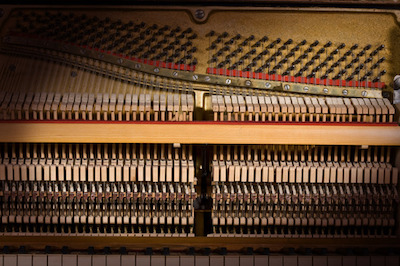Pianos are surprisingly delicate objects, considering their size and weight. They usually become the focal point of a room, no matter how often they are played.
If you expect them to make music indefinitely, a piano needs a little bit of TLC from time to time. They aren’t the same as other pieces of furniture in your home where an occasional dusting will do the trick. Pianos have to be maintained inside and out to remain viable instruments.
The first thing most people realize is that to stay playable, a piano needs regular tuning. Most manufacturers recommend about every six months. But if they are in a stable  environment and aren’t moved, it can last for up to a year. New pianos should also be tuned more often than well-stabilized instruments. Consider the fact that a violin or guitar will be tuned every time it is played, where as the piano will only receive one or two tunings per year. If you neglect piano tunings, the piano may fall significantly in pitch and require a much more elaborate pitch raising to bring it back into tune.
environment and aren’t moved, it can last for up to a year. New pianos should also be tuned more often than well-stabilized instruments. Consider the fact that a violin or guitar will be tuned every time it is played, where as the piano will only receive one or two tunings per year. If you neglect piano tunings, the piano may fall significantly in pitch and require a much more elaborate pitch raising to bring it back into tune.
While regular tuning will handle most of the maintenance issues, you should also consider having your instrument voiced occasionally. Voicing adjusts the density of the hammers. Each time a note is played, the hammers strike the piano strings, separated by small felt pieces. With each strike, these felt pieces compress and wear down. The result is a piano that slowly becomes brighter. Your piano should be voiced to your taste by a technician who understands the final quality you are looking for. It’s usually voiced as a new piano, and then again every three to five years.
As your piano ages, it will probably need regulation. Regulation is the process that a technician uses to adjust the way the keys and action operate in order to cause the hammers to hit the strings. This action repeats again and again every time the piano is played. Over time, this motion can become sloppy and difficult to play. It’ll start to feel sluggish and worn down. This is especially difficult for young children or for beginners learning how to play.
As your piano continues to age, it may reach a point where you’ll eventually have to consider rebuilding. Rebuilding includes replacing the hammers, dampers, pinblock, strings, the action, and sometimes the soundboard. This is an extensive process and can be quite expensive, depending on the instrument in question. If you’ve had the piano for many years, it’s a part of the family, it may be worth the time and effort to breathe new life into your piano. The only way to determine the condition of your piano and the possibilities rebuilding would offer is to speak with a reputable dealer who can answer your questions.
Some consideration should be given to the outside of the piano. Never use spray polish on your natural wood piano. Never use furniture polish on the black polyester finishes on many of the modern pianos. Instead, use a slightly damp soft cloth and wipe it down. You can use a non-ammonia window cleaner sprayed onto the soft cloth to keep the sheen in place.
Finally, be careful where you place your piano. Avoid placing it along outside walls where it may be impacted by extreme conditions. Avoid sunlight, drafts, heat vents, and humidity that may affect the wood and the internal workings of your piano.
What other questions do you have about maintaining your piano?

